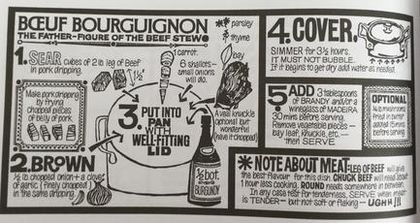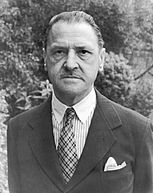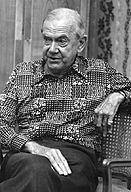Len Deighton facts for kids
Quick facts for kids
Len Deighton
|
|
|---|---|
| Born | Leonard Cyril Deighton 18 February 1929 Marylebone, London, England |
| Occupation |
|
| Alma mater | Royal College of Art |
| Spouse |
Ysabele de Ranitz
(m. 1980) |
| Children | Two |
Leonard Cyril Deighton (born 18 February 1929) is a British author. He has written many books, including exciting spy novels, cookery books, and history books. He is most famous for his spy stories.
After serving in the Royal Air Force, Deighton studied art in London. He became an illustrator for books and magazines. He even designed the cover for a famous book called On the Road. He also worked in advertising. While on holiday in France, he wrote his first novel, The IPCRESS File. It was published in 1962 and became very popular. He then wrote more spy novels about the same main character, who was a tough, unnamed spy from a working-class background.
From 1962 to 1966, Deighton also wrote about food for The Observer newspaper. He drew special "cookstrips," which were cartoon-style recipes. These were later put into a book called Len Deighton's Action Cook Book. He wrote five cookery books in total. He also wrote several books about military history. Many of Deighton's books have been best-sellers. People often compare his spy novels to those by other famous writers like John le Carré and Ian Fleming. Deighton's stories are known for being complex and feeling very real, thanks to his detailed research.
Many of Deighton's books have been made into films and radio shows. Some of the films include The Ipcress File (1965), Funeral in Berlin (1966), and Billion Dollar Brain (1967). In 1988, a TV series called Game, Set and Match was made from his spy trilogy. In 1995, BBC Radio 4 created a special radio play of his 1970 novel Bomber.
Contents
About Leonard Deighton
Early Life and First Jobs: 1929–1961
Leonard Cyril Deighton was born in London, England, on 18 February 1929. His family lived near Baker Street. When he was eleven, during the Second World War, he saw a woman arrested for being a spy. This event later inspired him to write his first spy story.
Deighton went to school in London. After school, he worked as a railway clerk. At 17, he joined the Royal Air Force (RAF) for his national service. He trained as a photographer and often took pictures at crime scenes for the military police. During this time, he also learned to fly and became a skilled scuba diver.
After two and a half years in the RAF, Deighton received a grant to study art. He went to Saint Martin's School of Art and then the Royal College of Art, graduating in 1955. While studying, he had a temporary job as a pastry chef in 1951. He also worked as a flight attendant for a year before becoming a professional illustrator. He drew for advertising companies in New York and London, and illustrated over 200 book covers.
Becoming a Writer: 1961–

While working as a pastry chef, Deighton started drawing sketches to remember recipe steps. This idea grew into his "cookstrip" concept: a full recipe shown as a cartoon. In 1961, one of his cookstrips was published in a newspaper. Soon after, The Observer newspaper asked him to create a weekly series, which he did from 1962 to 1966. He explained that drawing was a natural way for him to write down recipes.
In 1962, Deighton's first novel, The IPCRESS File, was published. He wrote it in 1960 while staying in France. The book quickly became a huge success, selling over 2.5 million copies in three years. The story was told by a tough, working-class spy who was never named. Deighton later said he kept putting off naming the character and then realized he didn't need to.
Deighton saw his spy character as a "romantic" figure, not an "anti-hero." He said the idea of a working-class spy among upper-class agents came from his own experience in advertising. He was the only board member who hadn't gone to a fancy private school. He felt The IPCRESS File was about a "grammar school boy among public school boys."
He wrote two more novels with his unnamed spy: Horse Under Water (1963) and Funeral in Berlin (1964). Funeral in Berlin was a best-seller in the US for twenty weeks. In 1965, he published two cookery books: Len Deighton's Action Cook Book (his collected cookstrips) and Où est le garlic (Where is the garlic), which had French recipes. These books also sold very well, making him a best-selling author in two different types of writing.
He continued his spy series with Billion-Dollar Brain (1966) and An Expensive Place to Die (1967). After these, he wrote his first history book, The Assassination of President Kennedy (1967). He also edited Len Deighton's London Dossier, a guidebook about London.
In 1968, Deighton was the producer for the film Only When I Larf, based on his own novel. He also helped write and produce Oh! What a Lovely War in 1969, but he didn't enjoy making films. In 1970, Deighton wrote Bomber, a fictional story about an RAF bombing raid that goes wrong. He used an early type of word processor to write it, possibly making it one of the first novels written this way.
In 1977, Deighton published Fighter: The True Story of the Battle of Britain. This book was well-liked by readers and critics. It included interviews with German participants, which was new for the time. A famous historian, A. J. P. Taylor, wrote the introduction and called it a "brilliant analysis."
His next novel was SS-GB (1978), which explored what might have happened if Germany had won the Second World War. Deighton continued to write history books, including Blitzkrieg (1979) and Blood, Tears and Folly: An Objective Look at World War II (1993).
Starting in 1983, Deighton wrote three connected series of spy novels. These trilogies featured a new main character named Bernard Samson, an intelligent but cynical spy. The first trilogy included Berlin Game (1983), Mexico Set (1984), and London Match (1985). A companion novel, Winter (1987), told the story of a German family and gave background to some characters in the trilogies.
Personal Life
Deighton married Shirley Thompson in 1960, but they later divorced in 1976. Since 1969, he has lived outside Britain in various countries like Ireland, France, and Portugal. In February 1980, he married Ysabele de Ranitz, who is the daughter of a Dutch diplomat. They have two sons.
Deighton prefers not to give interviews and rarely appears at book events. He once said that the best part of writing books is telling people you're a writer, but the hardest part is actually sitting down and writing. After finishing his last trilogy in 1996, he decided to take a year off writing. He then realized he didn't miss it and decided to retire from writing by 2016.
Deighton's Works
Experts say that Deighton, like John le Carré, follows in the footsteps of other great British spy writers such as W. Somerset Maugham and Graham Greene. Deighton's writing style is "energetic," and his fictional stories have complex plots. He loved doing research for his books, saying in 1976, "I like the research better than I like writing books." He was invited to join the Detection Club, a group of mystery writers, in 1969.
His Novels
According to film and media historian Alan Burton, The IPCRESS File and John le Carré's The Spy Who Came in from the Cold changed spy fiction in Britain. They brought a more realistic and cynical style to spy stories. Deighton's novels are described as "stylish, witty, and well-crafted." They give a believable look into the world of spying and make readers think about the right and wrong of that world. Deighton liked police procedural stories, which show how police work step-by-step, and he tried to write his spy novels in a similar "spy procedural" way.
The IPCRESS File came out around the same time as the first James Bond film, Dr. No. Deighton admitted that Bond's huge popularity helped his own career. However, he said his books were different from Ian Fleming's Bond stories, except that they were both about spies. After Funeral in Berlin was published in 1964, Deighton became one of the top spy writers, alongside Graham Greene, Ian Fleming, and John le Carré. His later books became even more subtle and had deeper characters.
Deighton is sometimes called the "angry young man" of spy novels. His main characters, like the unnamed spy from the IPCRESS series and Bernard Samson, are working-class, tough, and street-smart. This is different from the upper-class, sometimes ineffective, senior intelligence officers in his books. His working-class heroes also stand out compared to Fleming's smooth, upper-class character, James Bond.
Book and Film Adaptations
Several of Deighton's novels have been made into films. These include The Ipcress File (1965), Funeral in Berlin (1966), and Billion Dollar Brain (1967). In the films, the unnamed spy character from the books was given the name "Harry Palmer". The actor Michael Caine played Harry Palmer in most of these films. Deighton's own hands were even used in The Ipcress File for a scene where Palmer breaks eggs!
In March 2022, a new TV series based on The Ipcress File was shown in the UK. Joe Cole played Harry Palmer in this series.
Deighton's first trilogy of Bernard Samson novels—Berlin Game, Mexico Set, and London Match—were made into a thirteen-part TV series called Game, Set and Match in 1988. In 2017, the BBC also adapted Deighton's novel SS-GB into a five-part TV series.
In 1995, BBC Radio 4 created a special radio play of Bomber. The play was broadcast in four two-hour parts throughout the day, making it feel like it was happening in "real time."
Legacy and Impact
Other thriller writers, like Jeremy Duns, have said that Deighton's work influenced their own. The politician Aung San Suu Kyi mentioned reading Deighton's books while she was under house arrest. She said she loved his spy novels, along with those by Arthur Conan Doyle and John le Carré. The writer V. S. Naipaul also credited Deighton with helping him start his collection of Indian art.
Deighton's 1970 novel Bomber was listed in a 1984 book called Ninety-Nine Novels as one of the best novels in English since 1939. The rock band Motörhead even named their third album Bomber after the novel, because their singer, Lemmy, was reading it while they were recording.
Images for kids
See also
 In Spanish: Len Deighton para niños
In Spanish: Len Deighton para niños
 | Chris Smalls |
 | Fred Hampton |
 | Ralph Abernathy |





